9 Best Coding AI Copilots for 2025
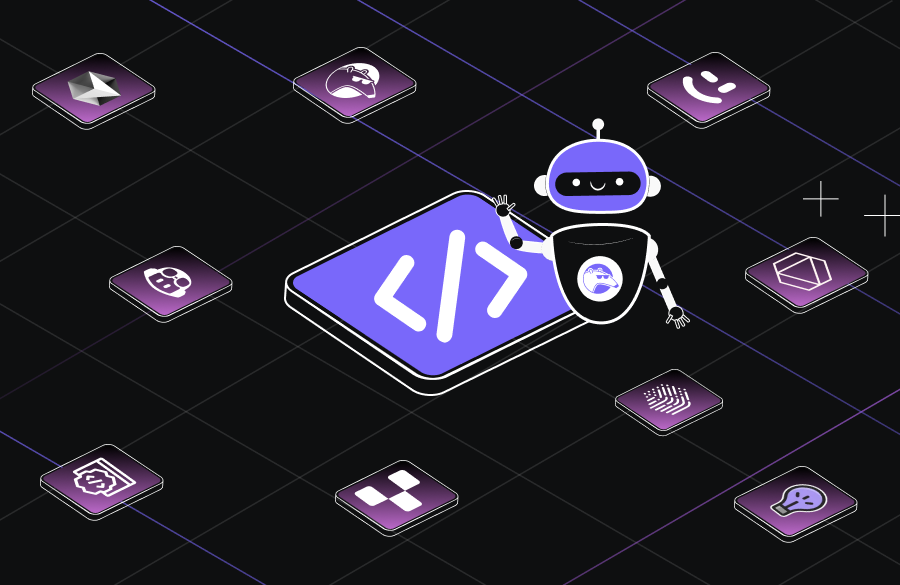

The Best Coding AI Copilots list by Category
General-Purpose AI Coding Assistants:
- Qodo Gen
- Github Copilot
- Amazon CodeWhisperer
AI Copilots for Learning & Collaboration:
- Replit
- AskCodi
- Cursor
Specialized AI Copilots for Niche Use Cases:
- Intellicode
- Tabnine
- Sourcegraph Cody

Nowadays, AI coding copilots offer far more than we might imagine. These tools not only enhance our creativity but also help turn our ideas into reality in real time. Who would have thought that by simply providing a hand-drawn sketch of a user interface, AI could generate its implementation?
With that in mind, I’ve compiled a list of AI coding copilots that I’ve personally tested. These tools can help you complete tasks within the estimated time frame-ensuring your manager stays happy with your productivity! 🙂
So, let’s get started!
9 Best Coding AI Copilots for 2025
1. Qodo Gen (formerly qodoate)
The first AI coding assistant on my list is Qodo, as it is a rising AI-powered tool with robust test case generation capabilities. Its ability to streamline the coding and testing process makes it a valuable addition for developers.
Pros of Qodo
- Accurate code suggestions: Delivers tailored recommendations, including docstrings, exception handling, and coding best practices, directly enhancing code quality. Helps developers write cleaner, more maintainable code.
- Code explanation: Analyzes and explains source code or snippets with in-depth descriptions. Provides insights and practical examples, improving comprehension for both novice and experienced developers.
- Automated test generation: Reduces manual effort by generating precise and reliable unit tests. Streamlines the testing process, particularly for extensive and complex codebases.
- Comprehensive code coverage: Ensures all code behaviors are thoroughly tested. Automatically creates test cases and seamlessly integrates necessary modifications into the source code.
- Effortless collaboration: Enhances teamwork with Git integration, enabling smooth code sharing and peer reviews. Supports efficient workflows and improves overall code quality.
- Seamless integration: An intelligent auto-completion agent aligns with task plans, simplifying the coding process from start to finish.
- Support for multiple languages and IDEs: Works with popular programming languages like Python, JavaScript, and TypeScript. Compatible with leading IDEs, including VSCode, WebStorm, IntelliJ IDEA, PyCharm, and JetBrains.
Cons of Qodo
- Premium features require payment: Advanced functionalities such as SOC2 compliance and static code analysis in Qodo Merge Pro are available only through a paid plan, which may be a limitation for smaller teams or independent developers.
My Experience with Qodo
While using Qodo Gen for a medical image computing project, I used it to generate explanations for the code in the train.py file. Qodo generated a comprehensive explanation of the code, including a summary, example usage, and code analysis with inputs, flow, and outputs:
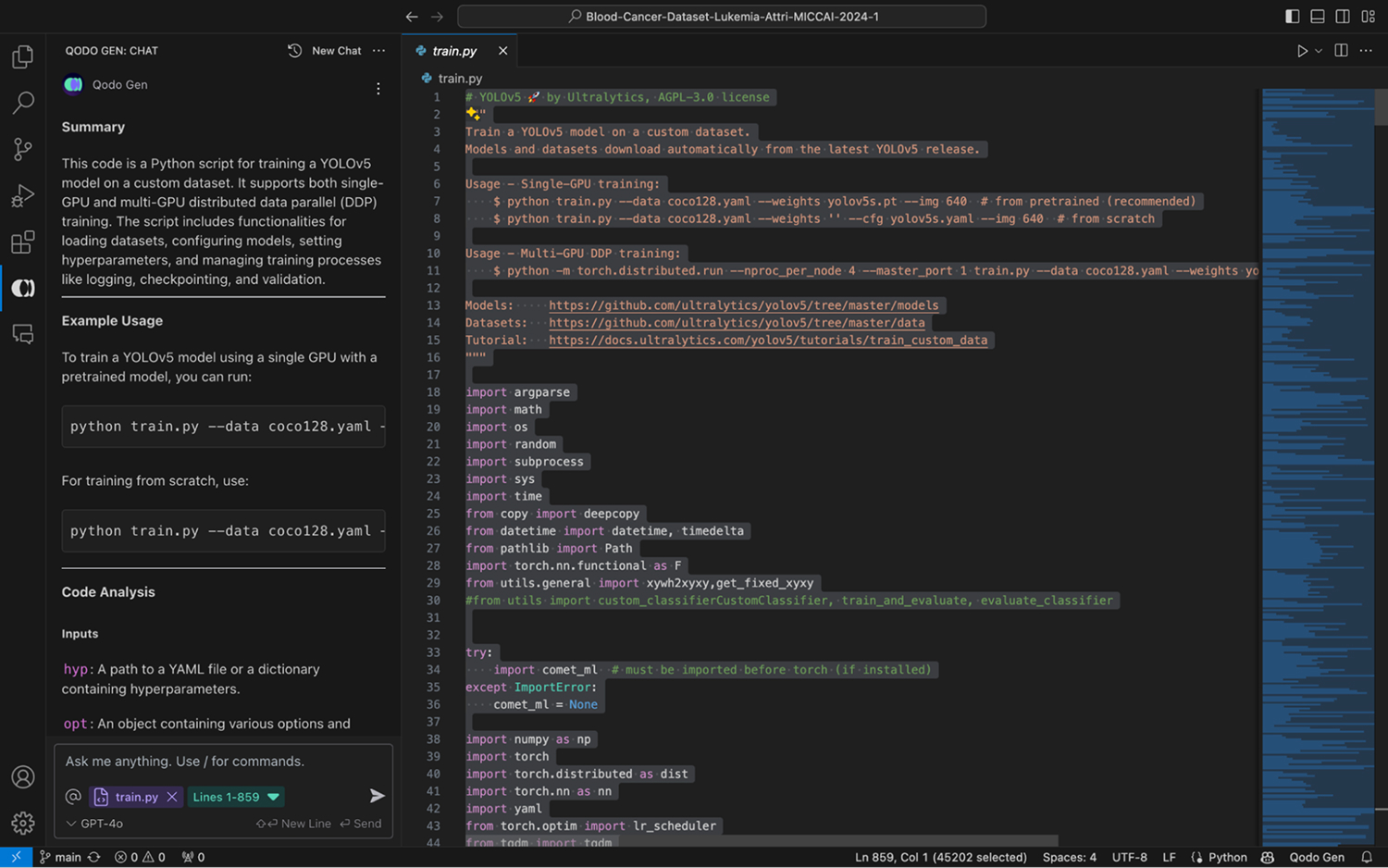
Pricing
There’s a free plan with basic features and a team plan that costs $19 per user per month. I’ve used both plans extensively, especially with complex Python projects related to computer vision. The team plan is worth the cost because it saves a lot of time during development and code reviews.
2. GitHub Copilot

GitHub Copilot is a powerful AI-driven coding assistant that autocompletes code, making it a valuable addition to my toolkit. Its ability to accelerate development and boost productivity is why it deserves a spot on this list.
The AI model behind GitHub Copilot is the result of a collaboration between GitHub, OpenAI, and Microsoft. This partnership has significantly transformed the coding experience by leveraging AI and machine learning.
Pros of GitHub Copilot
- Code suggestions: Autocompletes lines or entire functions based on code comments and context.
- Chat functionality: Includes an in-editor chatbot for asking questions, receiving suggestions, debugging, and interacting with natural language.
- Flexible auto-completion: Offers multiple auto-complete options, allowing developers to choose the best fit for their code.
- Wide language and IDE support: Integrates with popular IDEs like Visual Studio, Neovim, Visual Studio Code, and JetBrains, supporting languages such as TypeScript, Golang, Python, and JavaScript.
Cons of GitHub Copilot
- Code duplication: May generate repetitive code patterns, potentially leading to unintentional duplication across projects.
- Inconsistent code quality: Can produce incorrect or inefficient code, requiring developers to review and refine suggestions.
- Limited test case generation: Struggles to generate comprehensive test cases for large codebases, which can impact debugging and code quality.
- Premium features require payment: Advanced capabilities, such as access to GitHub Codespaces and team-based pull request reviews, are available only in the paid Team plan, restricting access for individual developers and small teams.
My Experience with Github Copilot
As shown in the image, I used GitHub Copilot to explain a function. With just two clicks, I was able to gain a thorough understanding of the function, including variable usage and its overall purpose, by reading the explanation provided by Copilot.
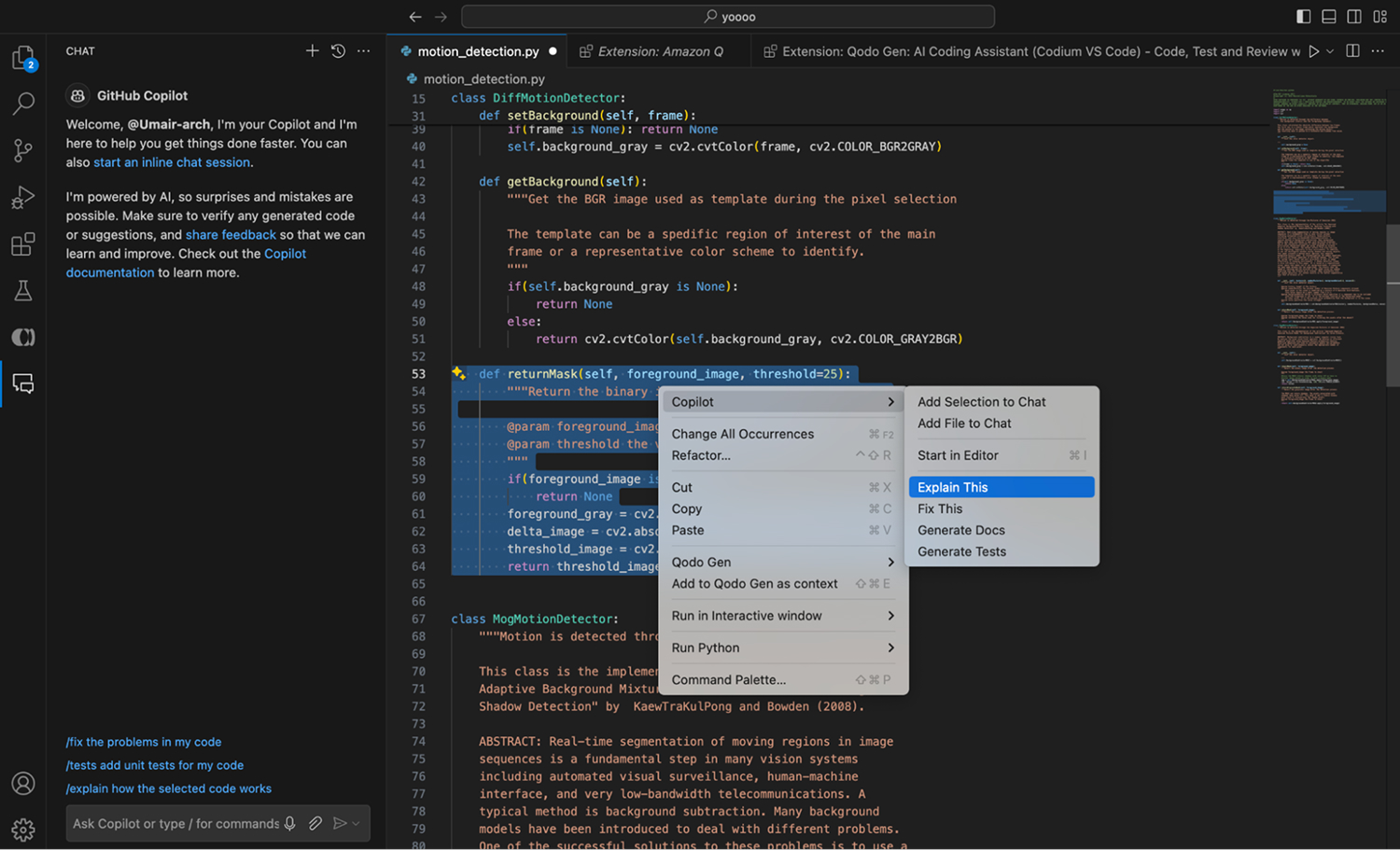
Pricing
The basic plan for individual developers is free. For teams and organizations requiring advanced collaboration features, Copilot offers a team plan priced at $4 per user per month.
3. Amazon CodeWhisperer

Amazon CodeWhisperer is an AI-powered coding assistant that has transformed the way I approach development, boosting both the speed and accuracy of writing code. Leveraging Amazon’s cutting-edge AI technology, it offers smart code suggestions, function completions, and automatic documentation creation with ease.
Pros of Amazon CodeWhisperer
- Code suggestions: Provides context-aware code snippets, functions, and even entire classes, which saves time, reduces errors, and simplifies the coding process.
- Function completion: Streamlines my workflow by suggesting subsequent lines or completing entire functions, which is especially useful when dealing with complex logic or repetitive tasks.
- Documentation generation: Automatically generates detailed documentation for my code, including function summaries, parameter descriptions, and return values, ensuring my projects are well-documented.
- Security scanning: Proactively scans for security vulnerabilities, helping me identify and fix potential issues before they arise.
- Language and IDE integration: Supports various languages like Python, JavaScript, C#, Rust, PHP, Kotlin, and SQL. It also integrates seamlessly with popular IDEs such as JetBrains and VS Code, making it easy to use.
Cons of Amazon CodeWhisperer
- Ambiguous code suggestions: Sometimes, the code suggestions may be unclear or not directly relevant to the task at hand.
- Limited free features: The free plan offers basic features but lacks some advanced functionalities that are available in the paid version.
- Cost of advanced features: The professional plan might be cost-prohibitive for individual developers or teams with limited budgets.
My Experience with Amazon CodeWhisperer
While testing various AI coding assistants, I had the opportunity to use Amazon CodeWhisperer with the VS Code extension. One standout feature was its ability to auto-complete and generate fake user data. It helped me create data structures and functions quickly, saving significant time and effort. Here’s an example of code generated using its auto-complete feature:
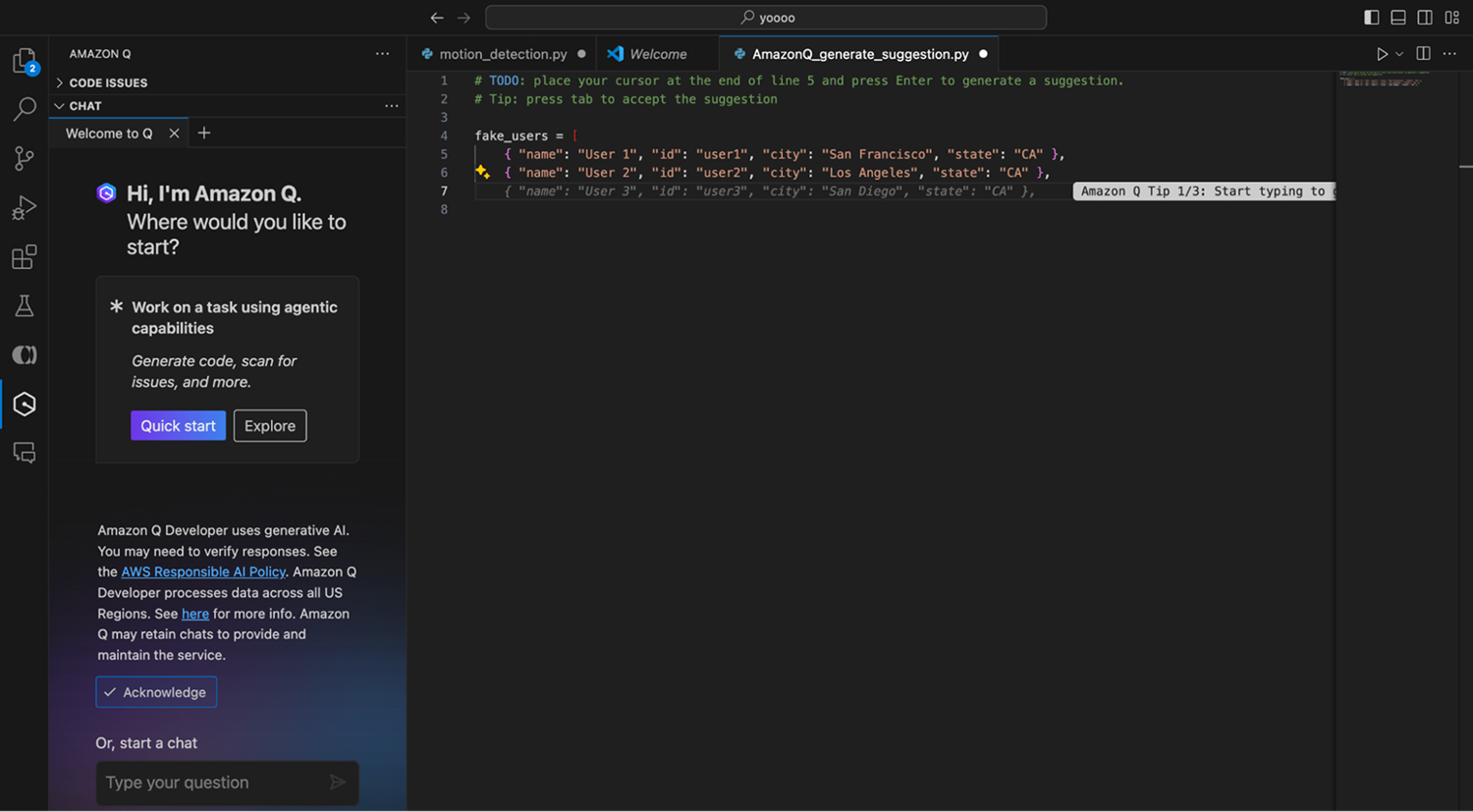
Pricing
Amazon CodeWhisperer offers a free plan for individuals, which is perfect for personal projects or occasional use. For those requiring more advanced features or professional support, there is a professional plan starting at $19 per month.
4. Replit

Replit is an AI-enhanced coding platform that integrates an interactive development environment, making it a great choice for both coding assistance and learning. I included it in this list for its ability to help developers write, understand, and improve their code efficiently.
Pros of Replit
- Real-time code suggestions: Provides in-line recommendations to speed up development and maintain code consistency.
- Code explanation & documentation: Breaks down code snippets with clear explanations and generates meaningful comments for better documentation.
- Error detection & fixes: Identifies coding mistakes and offers guidance for corrections, improving overall accuracy.
- Interactive learning environment: Supports hands-on learning, making it useful for both beginners and experienced developers.
Cons of Replit
- Limited language support: While Replit accommodates many languages, it may not fully support certain niche programming languages.
- Internet dependency: Since it is an online platform, a stable internet connection is required, which may be a limitation in offline scenarios.
My Experience with Replit
My experience with Replit was truly impressive and eye-opening. The sign-in process was seamless, and I used their free version to build a complete men’s clothing app from scratch. The AI agent intelligently analyzed my prompt, processed it, and generated the full application, including the complete code and file structure.
What amazed me the most was its ability to detect and fix errors automatically. When an issue arose during execution, the AI agent analyzed the error, identified the relevant code file, updated the code accordingly, and then re-ran the application.
The most exciting part was that Replit not only built the backend, database, and frontend but also executed the application using the necessary commands. This resulted in a well-structured app with functional buttons, working use cases, and an aesthetically pleasing UI-easily customizable to fit personal preferences. Additionally, Replit offers the option to deploy the application effortlessly. Here is the prompt I used: “Design and develop a sleek, user-friendly app for a men’s clothing brand that offers personalized style recommendations, virtual try-ons, easy browsing by categories, and seamless shopping with secure checkout.”
This is how the Replit playground looks, with the chat box on the left and the frontend design of my application on the right:

Pricing
Individual use is free, and there’s an option for subscription, which encompasses a Hacker plan at $7 per month and a Pro plan with advanced features priced at $20 per month.
5. AskCodi

AskCodi earned a spot on this list due to its practicality and reliability as an AI coding assistant that streamlines the development process. I’ve found it incredibly useful for boosting efficiency and solving coding challenges.
What sets AskCodi apart is its flexibility and user-friendly interface. It’s not just about generating code; it helps with learning, debugging, and improving code quality with minimal effort and integrates smoothly into popular development environments.
Pros of AskCodi
- Code generation: Can generate code across various languages, including Python, Java, TypeScript, Rust, Ruby, Kotlin, and more.
- Answering programming questions: Provides answers to coding-related questions in natural language, simplifying the understanding of new concepts and troubleshooting.
- Code suggestions: Analyzes your code and provides helpful suggestions to improve or fix issues, saving time and reducing errors.
- IDE integration: Integrates with IDEs like Visual Studio Code, PyCharm, and IntelliJ IDEA, enabling seamless use within your development environment.
Cons of AskCodi
- Questions structure: Formulating well-structured questions can be challenging, which may result in incomplete or inaccurate responses.
- Reliance on open-source code: Since it’s trained on open-source code, its ability to handle all use cases may be limited.
- Paid plan: Full access to the features requires a paid subscription, which might be a concern for some users.
My Experience with AskCodi
I primarily used AskCodi for its code suggestion feature, and it has been a valuable tool for enhancing my code. It analyzes my work and provides useful recommendations for improving structure, resolving issues, and optimizing performance. It feels like having an expert reviewer on my team, helping me catch mistakes early and saving time.
However, I’ve noticed that formulating the right questions can be tricky. If the query is unclear, the tool’s suggestions or explanations may not fully address the issue. While this hasn’t been a major setback, it serves as a reminder to be as precise as possible when posing natural language queries to maximize the tool’s effectiveness.
Pricing
AskCodi offers a Premium plan at $14.99/month, which includes enhanced storage and advanced AI capabilities. For those needing more features, the Ultimate plan is available at $34.99/month.
6. Cursor
Cursor is a highly efficient AI coding assistant designed to boost development productivity. It excels in intelligent autocomplete, code generation, and navigation predictions, making coding workflows smoother. However, it occasionally struggles with highly complex or specialized codebases. Despite this, it remains a valuable tool for developers looking to streamline their workflow.
Pros
- Smart autocomplete & code prediction: Goes beyond single-word suggestions, predicting entire multi-line edits based on recent modifications, significantly speeding up coding.
- Context-aware code generation: Understands project context and suggests relevant code snippets, minimizing the need for manual coding.
- Enhanced code editing: Supports refining and modifying code efficiently through intelligent multi-line edits and rewrites.
- Visual context support: Users can drag and drop images into the chat, improving issue explanations and collaboration.
Cons
- Limited free features: While essential functionalities are available for free, advanced capabilities require a paid plan.
- Internet dependency: Some features, like real-time web search and documentation retrieval, require an active internet connection.
My Experience with Cursor
I found Cursor to be a fascinating tool, so I decided to put it to the test by developing a full web application. I provided a simple prompt: “Create a web application just like a classroom, where students and teachers can interact. The app should include multiple classes that students can join, view lecture notes, and submit assignments.” To my surprise, Cursor generated a complete set of code files with a well-structured foundation, making it easy to customize and further develop the app to meet the project requirements.
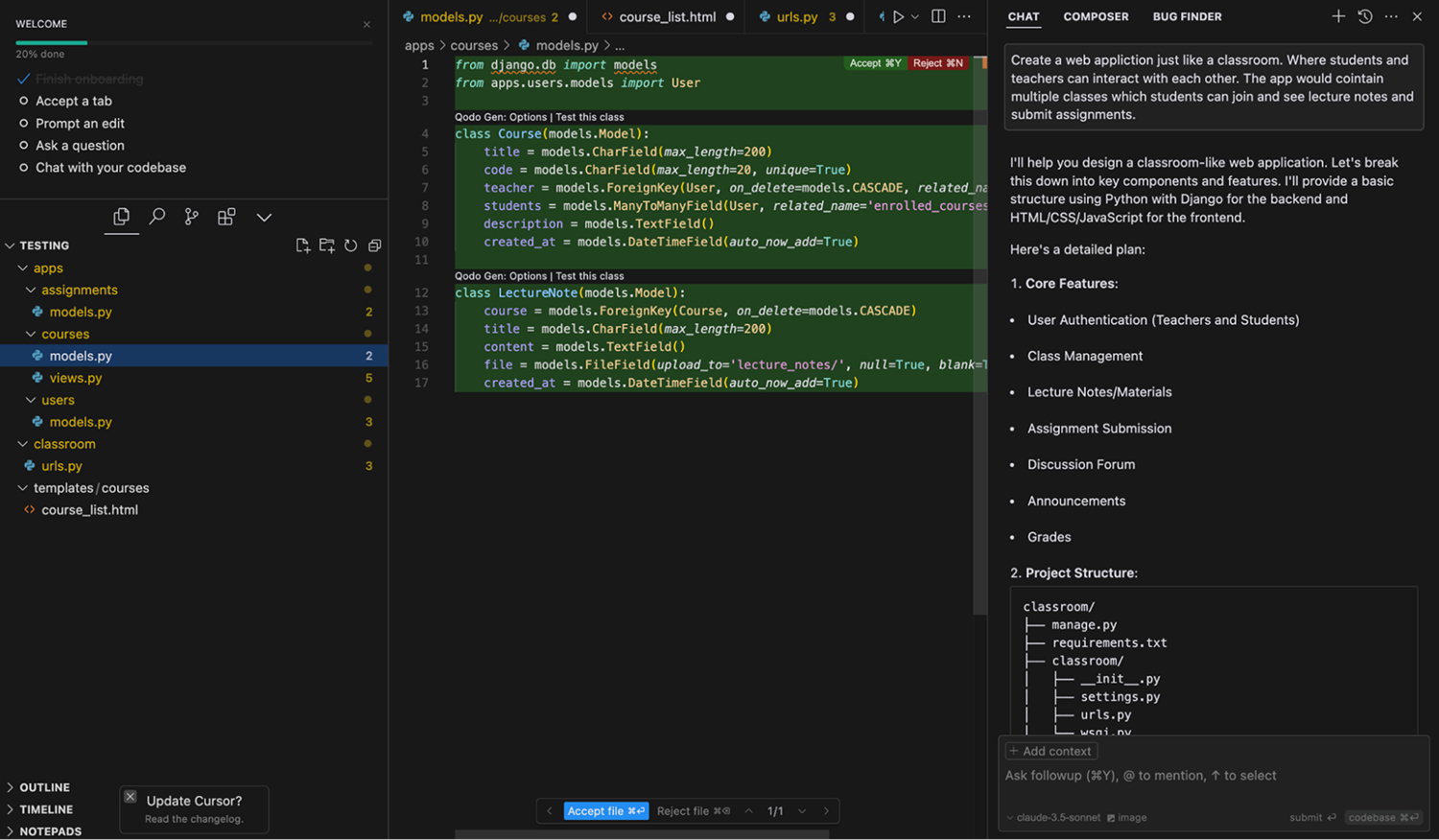
Pricing
The Individual plan is free, but if you want to use the tool extensively with unlimited completion requests, Cursor AI offers a paid plan for $20 per month.
7. Intellicode

I’ve included Microsoft IntelliCode in this list because of its seamless integration with Visual Studio and VS Code, providing intelligent code suggestions exactly when I need them. What makes it particularly valuable is how it learns from a vast number of open-source GitHub projects, offering highly relevant code completions.
Pros of IntelliCode
- Autocompletion: Speeds up coding by offering whole-line autocompletion, analyzing the context of your code.
- Improved privacy: Since IntelliCode operates locally on your machine, it ensures the privacy of your code while providing precise, context-aware suggestions.
- Contextual IntelliSense: Suggests the most relevant code snippets by analyzing thousands of open-source GitHub projects, ensuring that the completions are tailored to your needs.
- Repeated edits detection: Identifies repeated code edits, enabling developers to apply consistent changes throughout their codebase.
- Quick actions: Recognizes common coding patterns and tasks, suggesting quick actions such as generating constructors or adding parameters to existing constructors.
Cons of IntelliCode
- Limited effectiveness with complex codebases: Suggestions may not be as effective when working with large codebases or repositories involving multiple programming languages.
- Performance issues: IDE may experience slow load times when handling large codebases and projects.
My Experience with IntelliCode
I installed IntelliCode as a VS Code extension and tested it while working with MySQL connections. When I hovered over the ‘connect’ function in the line “database = mysql.connect()”, IntelliCode displayed real-world usage examples from GitHub. By selecting a suggestion, I was able to access detailed examples from GitHub repositories and seamlessly integrate them into my code.
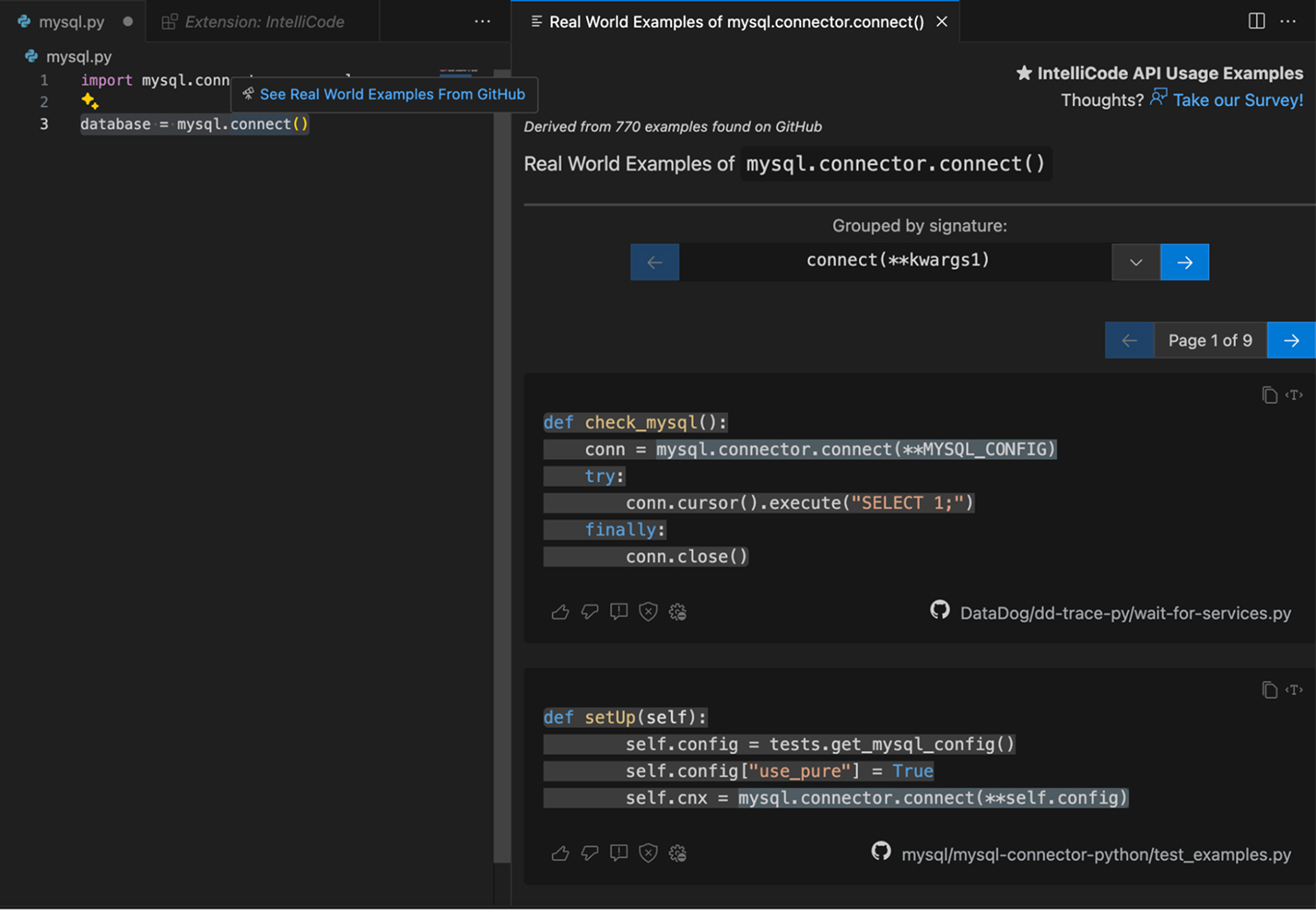
Overall, IntelliCode has proven to be a valuable tool in boosting my coding efficiency. It saves time by providing relevant examples directly within the IDE, eliminating the need to search for documentation or look up examples online.
Pricing
One of the best things about IntelliCode is that it’s completely free to use in Visual Studio Code. This makes it an accessible tool for developers of all levels.
8. Tabnine

I’m including Tabnine in this list because of its outstanding features that significantly enhance the coding experience. With capabilities like intelligent code completion, error detection and fixes, refactoring help, and automatic code documentation, Tabnine enables developers to write clean, efficient, and high-quality code.
Pros of Tabnine
- Code refactoring assistance: Offers helpful guidance and suggestions to refactor code, improving readability, efficiency, and maintainability.
- Code linting: Its linting feature is invaluable for identifying potential issues and suggesting fixes, ensuring clean, error-free code.
- Automatic code documentation: Automatically generates code documentation, simplifying collaboration and helping team members understand the codebase more easily.
- Intelligent code completions: Leveraging a vast dataset of open-source code, Tabnine provides contextually relevant code completions, saving time and reducing errors.
- Privacy and security: The enterprise version ensures that your code stays on your local server, providing full privacy and security.
- Customization: Can be adjusted to align with specific coding styles and project needs.
Cons of Tabnine
- Limited features in free version: The free version only offers basic code completion, with more advanced features locked behind a paid plan.
- Less intuitive suggestions for beginners: Since it doesn’t pull from public repositories, its suggestions may not always be as intuitive for beginners or those unfamiliar with specific programming languages.
My Experience with Tabnine
My experience with Tabnine has been highly positive. It assists with a variety of coding tasks, such as generating tests, fixing errors, and offering intelligent suggestions, all of which greatly improve my productivity and the quality of my code.
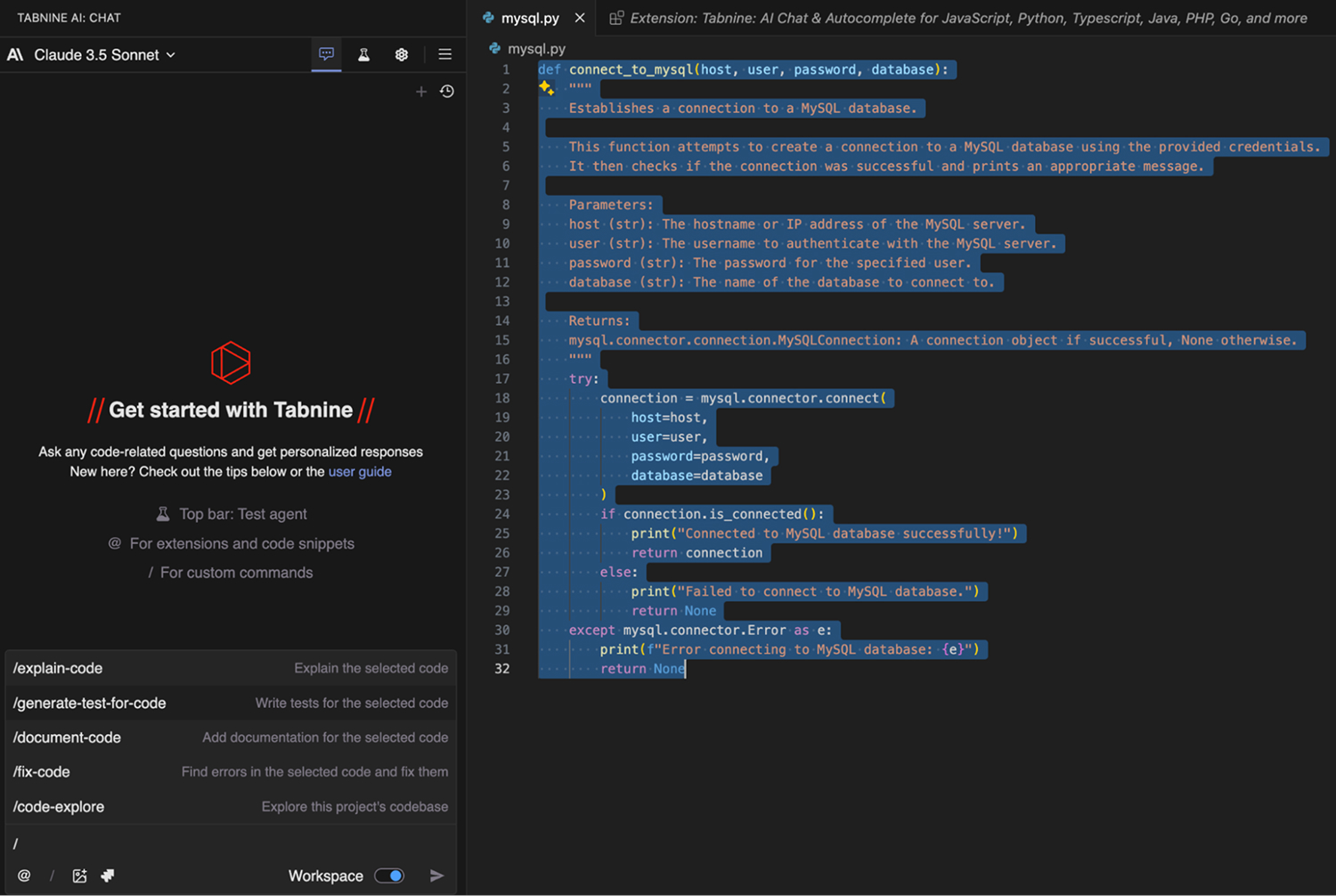
I started with some initial code that connected to a MySQL database. Using Tabnine’s “document code” command, I was able to enhance it. Tabnine suggested several improvements, such as creating a reusable function that encapsulates the core logic for establishing the database connection, along with adding clear documentation. These changes not only made the code more readable and maintainable but also improved its structure and reusability.
Pricing
Tabnine’s basic AI coding assistant is free to use. It includes basic AI code completions, AI-powered chat (with some limitations), and support for all major IDEs. For those who need advanced features, the pro plan is available at just $9 per user per month.
9. Sourcegraph Cody

I included Sourcegraph Cody in this list because of its seamless integration with Sourcegraph’s powerful search features. What sets it apart is its ability to understand my codebase, providing suggestions that are tailored to my repositories, documentation, and comments.
Pros of Cody
- Faster code generation: Quickly generates both small code snippets and complete functions across various programming languages.
- Code insights: Explains individual code segments or entire repositories, making it easier for developers to understand unfamiliar or complex projects.
- Quick unit test generation: Generate unit tests in a matter of seconds, allowing developers to focus more on building new features rather than testing.
- Code smell detection and optimization: Helps identify potential issues and bad coding practices, guiding users to refactor and optimize their code for better performance.
- Custom prompts: Developers can set custom prompts, enabling Cody to adapt to specific workflows and coding styles.
- AI-powered autocompletion: Offers intelligent autocompletion that can generate single-line codes or entire functions, speeding up development and reducing syntax errors.
- Contextual awareness: With its AI capabilities, Cody provides context-aware suggestions, explanations, and edits, offering more accurate completions and useful guidance.
- Support for multiple LLMs: Compatible with several large language models (LLMs), including Claude 3.5, GPT-4, Gemini 1.5, and Mixtral-8x7B. Users can also integrate their own LLMs through Amazon Bedrock and Azure OpenAI services.
Cons of Cody
- Limited language support: May not support every programming language.
- Subscription cost: The subscription fee may be a bit high for some users.
My Experience with Cody
I tested Cody’s VS Code extension to analyze and review a piece of code. The process was simple, and I received results with just one click. Below is a screenshot of the Sourcegraph Cody interface in VS Code, along with a coding example:
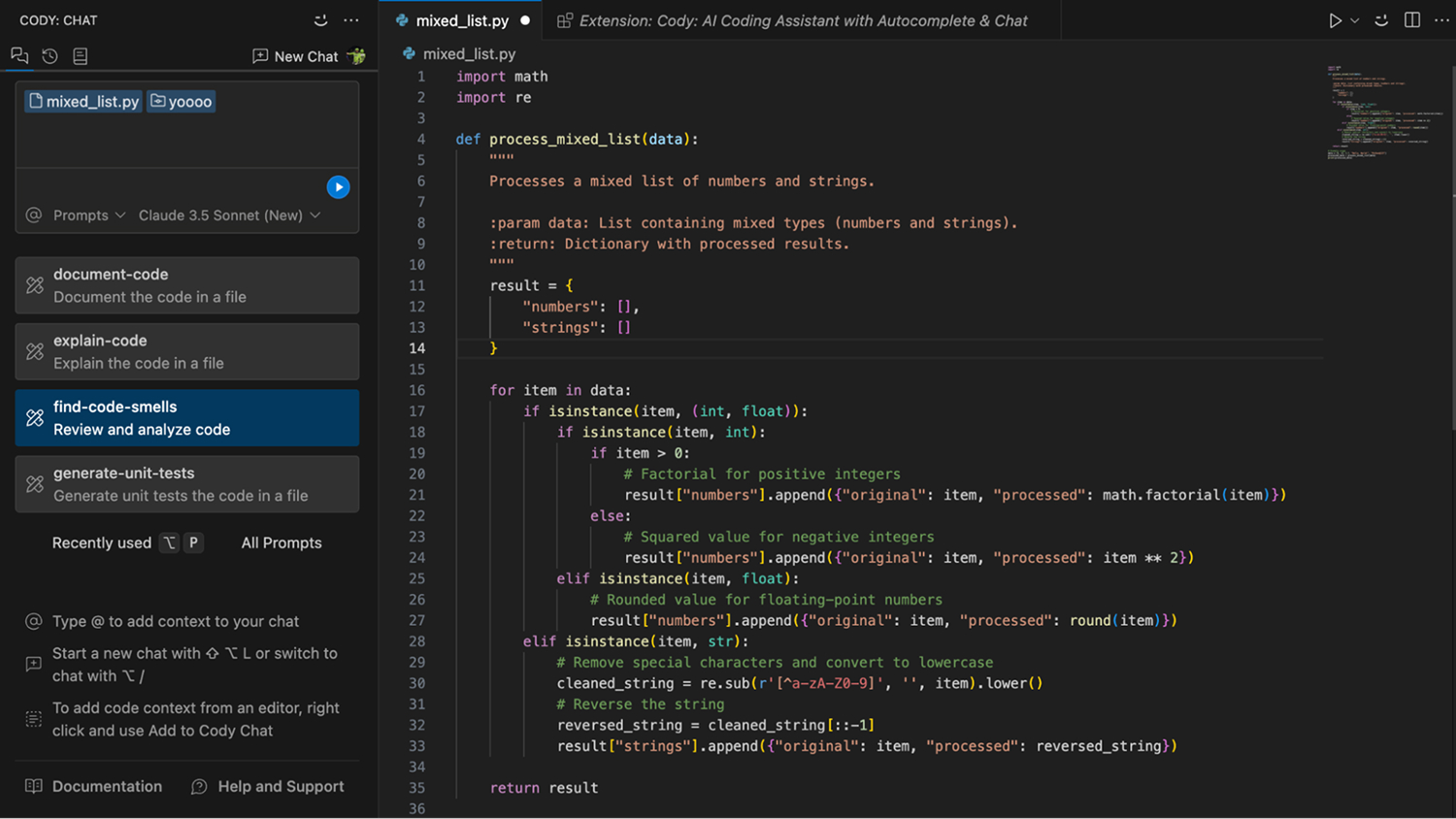
Here is a screenshot demonstrating Cody’s code smell detection for analysis and review. It offered five insightful suggestions, including input validation and type hints, complete with code examples and explanations of their benefits.
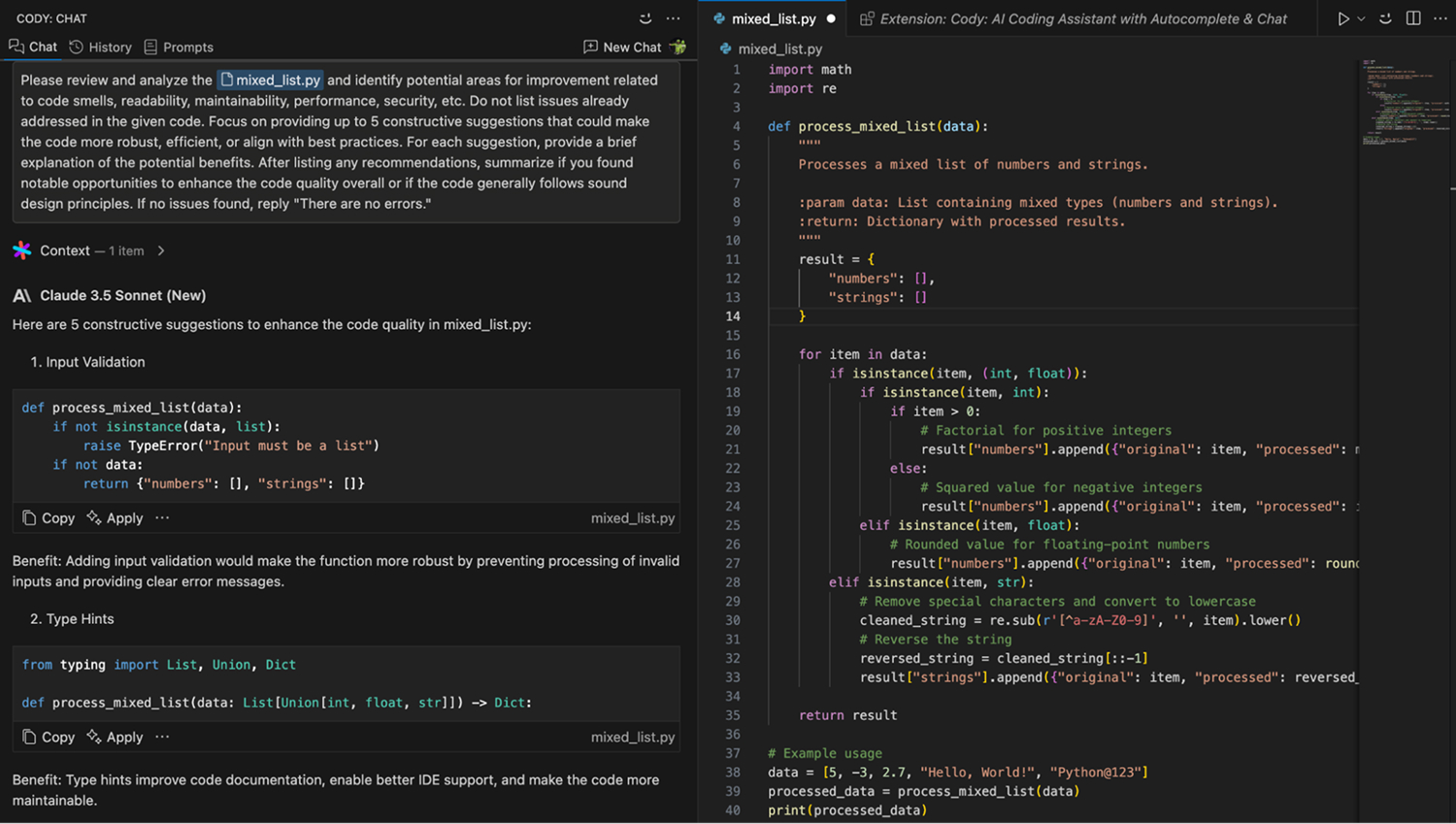
Pricing
Sourcegraph Cody offers a free version that works well for individual developers like me. The Pro plan at $9 per month suits small teams, while the Enterprise plan at $19 per user/month includes additional features for larger organizations. The pricing structure makes it accessible whether you’re an independent developer or part of a larger team.
Summary
| Tool | Pricing | Key features |
| Qodo | Free for individual use; $19/user/month for teams | Precise code suggestions, code explanation, automated test generation, code behavior coverage, streamlined collaboration, seamless implementation, multiple languages, and IDE support |
| GitHub Copilot | Free for individual use; $4/user/month for teams | Code suggestions, chat functionality, easy auto-complete navigation, multiple languages, and IDE support |
| Amazon CodeWhisperer | Free for individuals; Professional: $19/month | Code suggestions, function completion, documentation generation, security scanning, language and IDE integration |
| Replit | Free for individual usage; Hacker plan: $7/month; Pro plan: $20/month | Advanced in-line suggestions, code explanation, and comments, mistake detection and correction, interactive learning environment |
| AskCodi | $9.99/month for membership; Free for personal use | Code generation, answering programming questions, providing code suggestions, IDE Integration |
| Cursor | Both free and paid plans | Smart Autocomplete & Code Prediction, Context-Aware Code Generation, Enhanced Code Editing, Visual Context Support |
| Intellicode | Free to use | Real-world usage examples from GitHub, improved privacy |
| Tabnine | Free for basic AI code completions; Pro: $9/user/month | Code refactoring assistance, code linting, automatic code documentation, intelligent code completions |
| Sourcegraph Cody | Free for individuals; Paid subscription starts at $9/month | Code generation, insights, test generation, custom prompts |
Conclusion
The AI coding assistant landscape in 2025 offers diverse options for developers, with Qodo Gen emerging as a standout choice for its comprehensive features and precise code suggestions. While each tool has its strengths – from GitHub Copilot’s auto-completion to Replit’s interactive environment – the choice ultimately depends on specific needs and budget constraints. For developers seeking advanced features and seamless IDE integration, paid options like Tabnine Pro or Amazon CodeWhisperer Professional provide enhanced capabilities, while free alternatives like IntelliCode offer solid basic functionality for those just getting started.
Coding AI Copilots FAQs
What are Coding AI Copilots?
Simply, coding AI copilots are tools built with AI that help you with coding-related tasks throughout the SDLC process. These tools act as intelligent partners working alongside you, providing real-time support, such as code suggestions and completions for a streamlined coding experience.
Which AI chatbot is best for coding?
I find Qodo Gen to be the best AI coding assistant currently available. Its precise code suggestions, automated test generation, and multi-IDE support make it stand out. The PR review features and Git integration have significantly improved my development workflow. While it has some premium features that require payment, the benefits far outweigh the costs for serious developers.
How do AI coding copilots improve programming efficiency?
In my experience, AI coding copilots dramatically boost efficiency by providing real-time code suggestions, automating test generation, and handling repetitive tasks. They help me write cleaner code faster and catch potential issues early in the development process. The code explanation features also make it easier to understand complex codebases and maintain better documentation.
Are AI coding copilots compatible with all programming languages?
While most AI coding copilots support popular languages like Python, JavaScript, and TypeScript, support for niche languages can be limited. I’ve found that tools like Qodo Gen and GitHub Copilot offer the broadest language compatibility across major IDEs. Integration with VS Code and JetBrains products tends to be particularly robust and user-friendly.
How secure is the code generated by AI coding copilots?
From what I’ve seen, most AI copilots incorporate security scanning features. For instance, Amazon CodeWhisperer actively scans for vulnerabilities, though I always recommend reviewing generated code manually before implementation. Tools like Tabnine also prioritize privacy by keeping code on local servers for enterprise users.
How do AI coding copilots compare to traditional autocomplete tools?
I’ve found AI copilots to be far more sophisticated than traditional autocomplete tools. They understand context, can generate entire functions, and provide intelligent suggestions based on your codebase rather than just completing syntax. They also offer additional features like code explanation, documentation generation, and test case creation that traditional tools simply can’t match.
How are Coding AI Copilots beneficial for developers?
- By eliminating repetitive tasks and providing real-time suggestions, they enable developers to write code more quickly.
- As developers code, these tools detect possible errors and fixes, reducing the need for intensive debugging.
- They guarantee consistent code quality by enforcing coding best practices and standards throughout the project.
- They can convert natural language descriptions into code, making complex features simple.
- Without altering their workflow, developers may benefit from AI assistance through seamless integration into well-known IDEs.
- As these tools get to know a developer’s writing style, they offer increasingly tailored suggestions.


